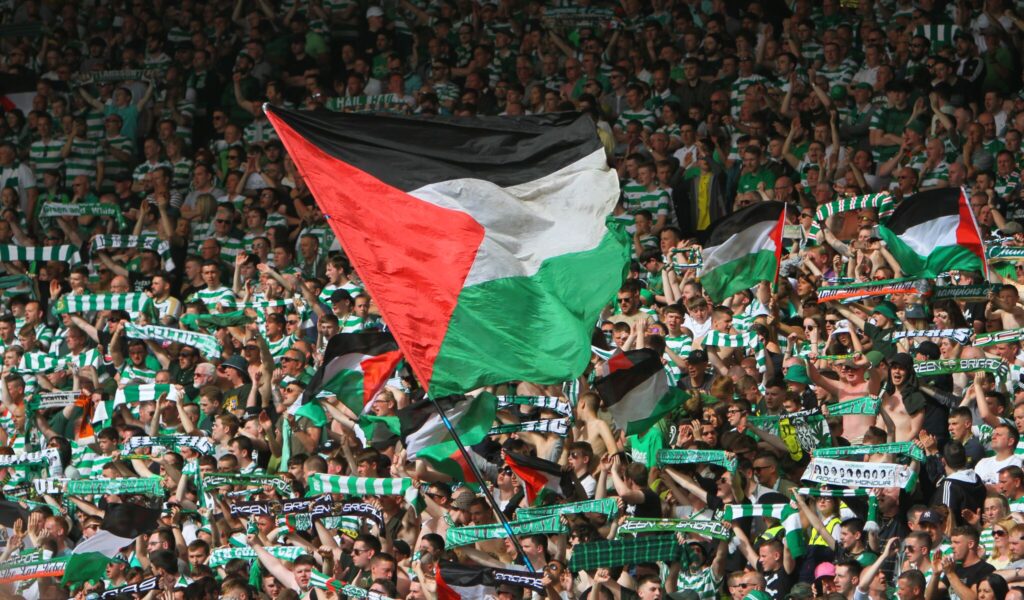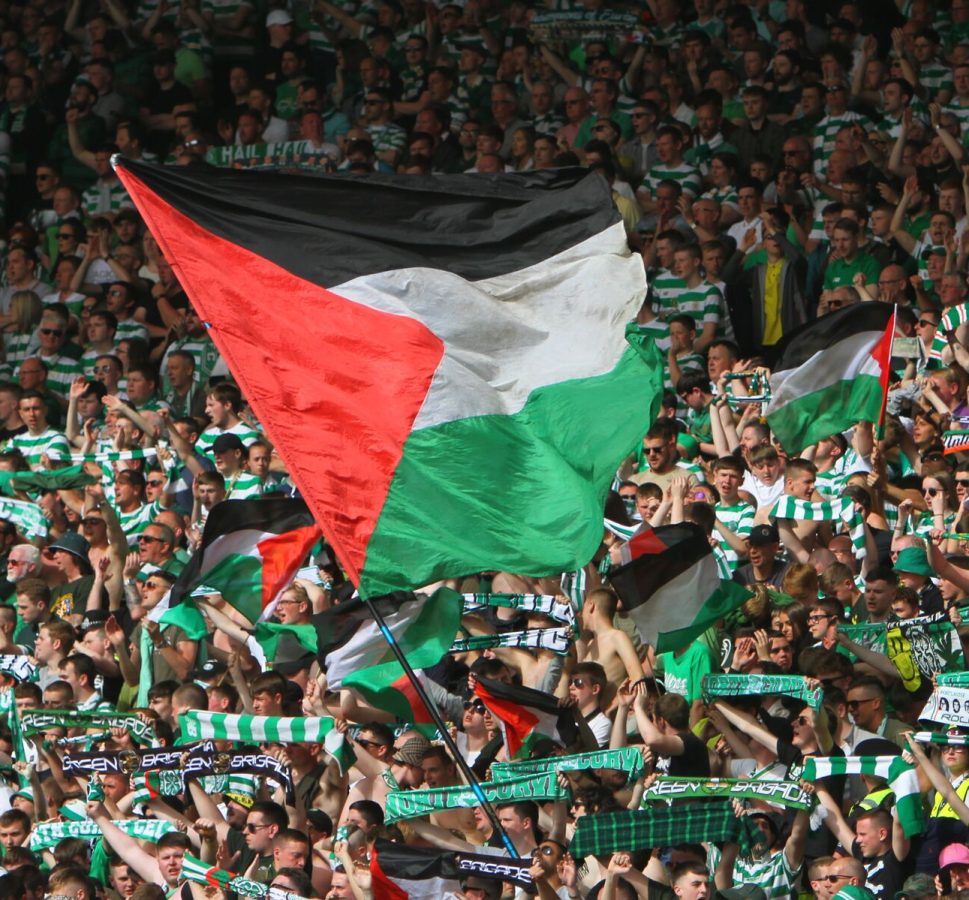
A chasm grows between the Glasgow club’s board and fans expressing solidarity with Gaza amid Israel’s assault.
Glasgow, Scotland – The atmosphere at Celtic Park on European nights needs few added extras, the electricity in the air on such occasions is enough to light up the Glasgow skyline several times over.
But as 60,000 Celtic fans flocked to the famous arena last Wednesday evening for the Champions League tie against Atletico Madrid, it was not just anticipation for the game powering the pre-match energy.
As kickoff neared, the stadium transformed into a sea of Palestinian flags, every stand awash with the colours of Palestine in a show of solidarity with those in Gaza under Israeli assault.
A few days before, when Celtic fans displayed Palestinian flags at a domestic away fixture, television networks were accused of purposefully avoiding the display. They had no such option this time. The display was beamed around the world, and quickly shared millions of times on social media.
The main flag bearers, literally and figuratively, are the Green Brigade – an “ultras” group formed in 2006, renowned for their Irish Republicanism and unflinching support for the Palestinian cause.
It’s a position that has attracted many admirers but often puts them at loggerheads with the club’s board, which is more politically conservative than the fanbase.
Fearful of penalties from football’s governing bodies, the club urged fans not to heed the Green Brigade’s call to show support for Palestine at the Atletico Madrid game, releasing a statement asking “that banners, flags and symbols relating to the conflict and those countries involved in it are not displayed at Celtic Park at this time”.
A few days prior to the match, in an apparent warning to the group, Celtic banned the Green Brigade from all away games. Following the display against Atletico Madrid, that ban has been extended to all home games.
In a letter to fans, the club outlined several reasons for the ban, including anti-social behaviour, the use of pyrotechnics and crucially “against Atletico Madrid, another unauthorised display, breaching the restrictions previously communicated”.
For the Green Brigade, there’s little doubt that it was the Palestine display which has led to the ban.
“The other issues are a smokescreen,” the Green Brigade told Al Jazeera. “The club are very clever and cynical. They want to sanction us, they want to punish us. They want to send us a message to try to keep us in line and deter us from doing further action.
But they know very well that on the issue of Palestine, they’re not on strong ground as they don’t have a lot of support amongst the wider fanbase on that issue. So they’re using other issues that they think they will have support on to sanction us.”
The Green Brigade also told Al Jazeera that senior Celtic officials had previously told them privately that they were most concerned with “their corporate image and corporate responsibilities” to shareholders.
“But we’re unashamed of and unequivocal of our support for Palestine and that will continue,” the group said.
“And once again the wider Celtic support showed that they too had the courage and conviction to stand and be counted. To side with the right side of history and voice support for the underdog, which in this case is the Palestinians.”
The club did not respond to Al Jazeera’s requests for comment.
‘They give us hope we’re not alone’
For those familiar with Celtic’s origin story, as a club born from the Irish Catholic diaspora in Scotland, the fans’ solidarity with the assault on Gaza was no surprise. Support for left-wing, anti-imperialist causes among the fanbase is common.
Banning the Green Brigades is a risky escalation by the club, as the group are popular among the wider Celtic support.
Indeed, flags supporting Palestine at Celtic Park predate the group’s formation. Both the shareholders group The Celtic Trust and fellow ultras group Bhoys Celtic have condemned the ban, with the latter staging a walkout in protest at the recent game against St Mirren.
“There will be no return to normality from us while this absurd and entirely avoidable situation is allowed to continue,” the group said in a statement, suggesting that further walkouts or boycotts could take place.
With the ban on the 300 or so supporters being indefinite “pending further review”, the situation leaves Celtic a club at civil war at a crucial time in the season.
Some fans believe their political displays can occasionally go too far, but all agree that their absence will negatively impact the atmosphere at games.
There is also precedent for Celtic fans uniting on the issue of Palestine. When the Green Brigade showed support for Palestine in a tie against the Israeli club Hapoel Be’er Sheva in 2016, the club were fined by UEFA for the display of “illicit banners”.
The wider fanbase swung behind a fundraising campaign; not to pay the fine, but to support charities in Palestine.
More than 175,000 pounds ($214,000) was raised, which helped to fund the formation of Aida Celtic, a football team in Aida refugee camp in Bethlehem, the occupied West Bank. The links established then have solidified in the seven years since, with regular exchange visits made as part of a deepening of fans’ education of the Palestine issue.
Indeed, while the Celtic board may have shifted uncomfortably in their seats as they saw the Palestinian flags unfurled last Wednesday, the intended recipients of the gesture, the people of Gaza, welcomed it warmly.
“We thank Celtic fans for this stand and for their ongoing solidarity to the Palestinian people in Gaza,” Hazem Tabash, the manager of the Benn’a Sports Club in Gaza told Al Jazeera, who saw the images online despite Israel’s communication blackouts and widespread bombing in the besieged territory.
The Benn’a youth centre’s footballers have played previously in green and white hoops of Celtic.
But its pitch currently lies desolate, if not destroyed. Located near the border fence in the eastern Gaza Strip, all staff and volunteers were forced to flee when the Israeli bombing started on October 7, after Hamas launched deadly attacks in Israel that killed 1,405 people, most of whom were Israeli civilians.
Israel’s retaliatory attacks have killed at least 9,061 people, including 3,760 children.
“[The fans’] actions are important to raise awareness of the public in Western countries where governments give Israel full support to continue its crimes against Palestinians in Gaza,” Tabash said of the display at Celtic Park. “They also help to support us Palestinians on the ground, giving us some hope that we are not alone.
“I call for all fans who believe in justice and freedom to follow the steps of Celtic fans and ask your governments to act immediately to stop this genocide and stop the double standards and the bias when it comes to the Palestine-Israel conflict.”
Accusations of double standards relate not just to how governments are acting on this matter, but also to football authorities. There was widespread support for Ukraine in the footballing world when it was invaded by Russia last year. Indeed, Russian clubs were even banned from European competition.
But a very different approach is taken to any display of support for Palestinians.
“Why are the football authorities uncomfortable with football fans expressing solidarity with the Palestinian people?” said David Webber, a senior research fellow at Solent University specialising in football and politics.
“UEFA and FIFA were quite quick to exclude Russia from international competition and club competition. But we don’t see that same treatment of Israel. Does it really just boil down to the fact the Palestinians are brown and not white?”
“It’s all part of trying to neutralise football as a product but what that does is it starves the game of its authenticity. The values that the fans have matter and are inextricable to the clubs they support. However much the clubs might want to expunge it, these values are not just left at the turnstile.”
The Green Brigade, meanwhile, told Al Jazeera they intend to stick to their motto: Until The Last Rebel.
“The political class like to tell working-class people that they don’t know what they’re talking about or that they can’t have an opinion on certain issues,” they said.
“We’re a proudly politically conscious group. We won’t be dictated to by anyone.”
https://imasdk.googleapis.com/js/core/bridge3.599.0_en.html#goog_1932302823Play Video
Video Duration 26 minutes 00 seconds26:00The Fans Who Make Football: Celtic FC | Featured Documentary






